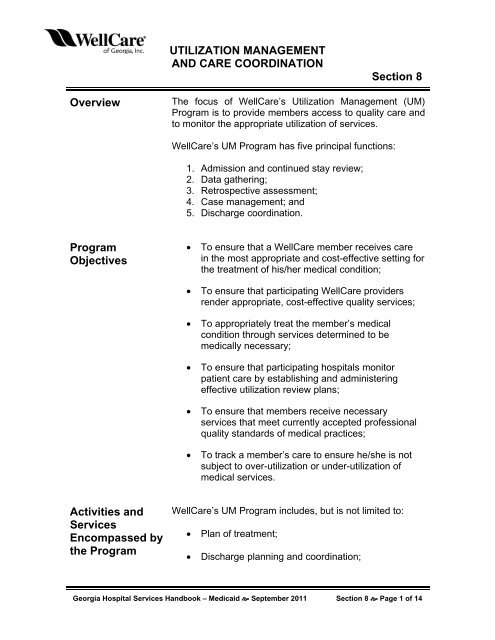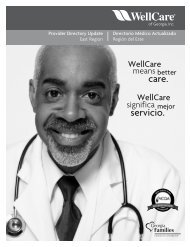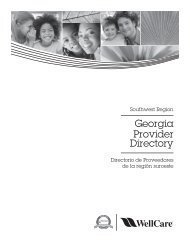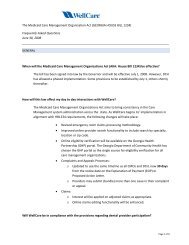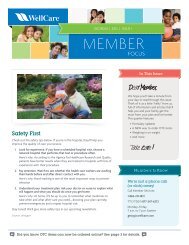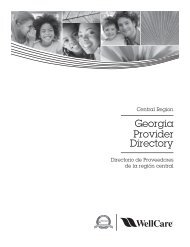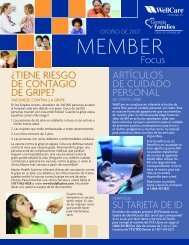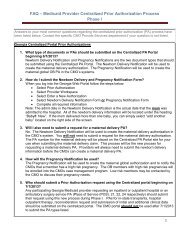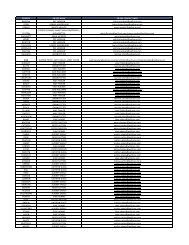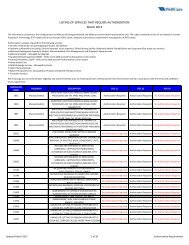UTILIZATION MANAGEMENT AND CARE ... - WellCare
UTILIZATION MANAGEMENT AND CARE ... - WellCare
UTILIZATION MANAGEMENT AND CARE ... - WellCare
You also want an ePaper? Increase the reach of your titles
YUMPU automatically turns print PDFs into web optimized ePapers that Google loves.
Overview<br />
Program<br />
Objectives<br />
Activities and<br />
Services<br />
Encompassed by<br />
the Program<br />
<strong>UTILIZATION</strong> <strong>MANAGEMENT</strong><br />
<strong>AND</strong> <strong>CARE</strong> COORDINATION<br />
Section 8<br />
The focus of <strong>WellCare</strong>’s Utilization Management (UM)<br />
Program is to provide members access to quality care and<br />
to monitor the appropriate utilization of services.<br />
<strong>WellCare</strong>’s UM Program has five principal functions:<br />
1. Admission and continued stay review;<br />
2. Data gathering;<br />
3. Retrospective assessment;<br />
4. Case management; and<br />
5. Discharge coordination.<br />
To ensure that a <strong>WellCare</strong> member receives care<br />
in the most appropriate and cost-effective setting for<br />
the treatment of his/her medical condition;<br />
To ensure that participating <strong>WellCare</strong> providers<br />
render appropriate, cost-effective quality services;<br />
To appropriately treat the member’s medical<br />
condition through services determined to be<br />
medically necessary;<br />
To ensure that participating hospitals monitor<br />
patient care by establishing and administering<br />
effective utilization review plans;<br />
To ensure that members receive necessary<br />
services that meet currently accepted professional<br />
quality standards of medical practices;<br />
To track a member’s care to ensure he/she is not<br />
subject to over-utilization or under-utilization of<br />
medical services.<br />
<strong>WellCare</strong>’s UM Program includes, but is not limited to:<br />
Plan of treatment;<br />
Discharge planning and coordination;<br />
Georgia Hospital Services Handbook – Medicaid September 2011 Section 8 Page 1 of 14
Review<br />
Functions<br />
for Authorized<br />
Hospitals<br />
<strong>UTILIZATION</strong> <strong>MANAGEMENT</strong><br />
<strong>AND</strong> <strong>CARE</strong> COORDINATION<br />
Section 8<br />
Oversight of hospital utilization review committee<br />
monitoring activities;<br />
Authorization of need for acute care;<br />
Review of need for continued stay;<br />
Post payment review and assessment, including<br />
length of stay and ancillary service review;<br />
Data gathering; and<br />
Referral for educational services.<br />
Hospitals must meet the federal and state requirements for<br />
control of utilization of inpatient services including:<br />
Authorization and re-authorization of the need for<br />
acute care;<br />
Treatment pursuant to a plan of care; and<br />
Operation of utilization review plans.<br />
At the time a <strong>WellCare</strong> member is admitted into a hospital<br />
for inpatient services, the admitting physician must certify<br />
that the inpatient services are medically necessary. The<br />
authorization must be made at the time of admission, or in<br />
the case of pending eligibility, before Medicaid payment is<br />
authorized. This requirement can be met by a<br />
comprehensive note in the medical record at the time of<br />
admission.<br />
The attending physician, or authorized representative,<br />
must re-certify that inpatient services continue to be<br />
medically necessary and appropriate to the acute care<br />
setting. This requirement can be met by a comprehensive<br />
progress note in the medical record at least every two<br />
days.<br />
Georgia Hospital Services Handbook – Medicaid September 2011 Section 8 Page 2 of 14
Services<br />
Which Require<br />
Prior<br />
Authorization<br />
<strong>UTILIZATION</strong> <strong>MANAGEMENT</strong><br />
<strong>AND</strong> <strong>CARE</strong> COORDINATION<br />
Section 8<br />
<strong>WellCare</strong> requires that a written plan of care be completed<br />
and submitted for each member:<br />
Prior to authorization for payment before admission<br />
to a hospital for elective admissions, or<br />
By the next business day for emergency admissions<br />
The plan should be multi-disciplinary and should include at<br />
least the attending physician and the nursing staff. The<br />
plan must include:<br />
Diagnoses, symptoms or complaints indicating the<br />
need for admission;<br />
A description of the functional level of the individual;<br />
Medication or treatment orders;<br />
Diet and activity level;<br />
Plans for hospital course; and<br />
Plans for discharge.<br />
In order to provide the best care possible for members, the<br />
Plan requires that all planned inpatient hospital<br />
admissions/observations and all outpatient procedures be<br />
prior approved.<br />
For services requiring prior authorization, and for the<br />
telephone number of the Utilization Management<br />
Department, refer to the Quick Reference Guide.<br />
The goal of prior authorization is to ensure that medically<br />
necessary, cost-effective services are provided to eligible<br />
<strong>WellCare</strong> members. Prior authorization is necessary for<br />
reimbursement; however, it does not guarantee payment.<br />
In addition, the requirement for prior authorization pertains<br />
to medical necessity and appropriateness of setting. The<br />
member must be eligible with the Plan at the time the<br />
service is rendered. The hospital medical record must<br />
Georgia Hospital Services Handbook – Medicaid September 2011 Section 8 Page 3 of 14
Procedures<br />
for Obtaining<br />
Prior<br />
Authorization<br />
for All Medical<br />
Services Except<br />
Dental Services<br />
and Transplants<br />
<strong>UTILIZATION</strong> <strong>MANAGEMENT</strong><br />
<strong>AND</strong> <strong>CARE</strong> COORDINATION<br />
Section 8<br />
substantiate the medical necessity including the<br />
appropriateness of the setting for the services provided<br />
and billed to <strong>WellCare</strong>. All services are subject to review<br />
for medical necessity.<br />
The Plan has up to 14 calendar days to determine whether<br />
a service requested is a medically appropriate and<br />
covered service. When possible, decisions on prior<br />
authorization will be rendered by the Plan within two<br />
business days after adequate medical information has<br />
been received to determine medical necessity and<br />
appropriate level of care.<br />
FAILURE TO OBTAIN REQUIRED AUTHORIZATION<br />
WILL RESULT IN DENIAL OF THE CLAIM.<br />
The attending physician or hospital staff is responsible for<br />
obtaining prior authorization from <strong>WellCare</strong> and for<br />
providing the prior authorization number to each <strong>WellCare</strong><br />
provider associated with the case; i.e., assistant physician,<br />
hospital, etc. Failure to obtain prior authorization will result<br />
in denial of payment.<br />
Requests for prior authorization should be submitted at<br />
least 10 business days prior to the planned admission or<br />
procedure. Once a procedure is approved, the approval is<br />
only valid for 90 days from the date of issuance.<br />
In cases when prior authorization has been obtained for an<br />
outpatient procedure, and during the procedure it is<br />
determined that the member requires an additional or<br />
different procedure, the procedure will be considered an<br />
urgent procedure. The hospital's request for an update of<br />
the prior authorization will be considered timely if received<br />
within one business day of the date of the procedure.<br />
When prior authorization has been obtained for an<br />
outpatient procedure, and after the procedure has been<br />
performed it is determined that the member requires<br />
inpatient services, the admission should be considered an<br />
emergency. The hospital should notify <strong>WellCare</strong> of the<br />
Georgia Hospital Services Handbook – Medicaid September 2011 Section 8 Page 4 of 14
Procedures for<br />
Obtaining<br />
Prior<br />
Authorization for<br />
Dental Services<br />
Requiring<br />
Hospitalization<br />
Procedures for<br />
Obtaining<br />
Prior<br />
Authorization for<br />
Transplants<br />
<strong>UTILIZATION</strong> <strong>MANAGEMENT</strong><br />
<strong>AND</strong> <strong>CARE</strong> COORDINATION<br />
Section 8<br />
admission within 24 hours, and the request for a clinical<br />
update should be considered timely if received within one<br />
business day of the beginning date of the episode of care.<br />
Hospital requests for updates of authorization and<br />
retroactive authorizations of inpatient admissions following<br />
a procedure will be denied if it is determined that the<br />
procedure clearly required an inpatient level of care that<br />
should have been anticipated.<br />
When it is determined that a member with outpatient<br />
observation status requires inpatient services, the request<br />
for authorization must be received within one business day<br />
of the beginning of the episode of care.<br />
Prior authorization is required for any dental service<br />
requiring inpatient or outpatient hospitalization. It is the<br />
responsibility of the attending dentist to obtain prior<br />
authorization and to provide the prior authorization number<br />
to the hospital. The failure of the attending dentist to obtain<br />
the correct prior authorization number will result in denial<br />
of payment.<br />
For prior authorization of Dental Services requiring<br />
hospitalization, contact the Plan’s Utilization<br />
Management department at the telephone number<br />
listed on the Quick Reference Guide.<br />
In order to receive prior authorization for a transplant, a<br />
written request with medical records must be received by<br />
<strong>WellCare</strong> for review. This pertains to liver, bone marrow,<br />
kidney and cornea transplants as well as medically<br />
necessary heart, lung and heart/lung transplants for<br />
members under the age of 21. These records must include<br />
current medical history, pertinent laboratory findings, X-ray<br />
and scan reports, social history and test results that<br />
exclude viremia and other relevant information.<br />
Transplant procedures and related services must be<br />
approved by <strong>WellCare</strong> prior to the transplant, regardless of<br />
the age of the member. Once a transplant procedure is<br />
Georgia Hospital Services Handbook – Medicaid September 2011 Section 8 Page 5 of 14
Procedures for<br />
Obtaining Prior<br />
Authorization for<br />
Observation<br />
Services<br />
<strong>UTILIZATION</strong> <strong>MANAGEMENT</strong><br />
<strong>AND</strong> <strong>CARE</strong> COORDINATION<br />
Section 8<br />
approved, a prior authorization number will be assigned.<br />
The member must be eligible at the time services are<br />
provided, and these services cannot be approved<br />
retroactively.<br />
For requests for approval of coverage of all transplant<br />
services, contact the Plan’s Utilization Management<br />
department at the telephone number listed on the<br />
Quick Reference Guide.<br />
All observation services require authorization. Observation<br />
should be considered if the patient does not meet acute<br />
care criteria, and any of the following apply:<br />
Diagnosis, treatment, stabilization and discharge<br />
can reasonably be expected within 24 to 48 hours;<br />
The clinical condition is changing and a discharge<br />
decision is expected within 48 hours;<br />
Complications or extended observation post<br />
ambulatory surgery/procedure;<br />
Symptoms unresponsive to at least four hours<br />
emergency room treatment; or<br />
Psychiatric crisis intervention/stabilization with<br />
observation every 15 minutes;<br />
At 48 hours, if the patient is not stable for discharge, acute<br />
care criteria will be applied.<br />
The decision to admit a patient continues to be the<br />
responsibility of the treating provider. If cases arise where<br />
the circumstances would pose a hazard to the patient’s<br />
health and/or safety and the appropriate setting is in<br />
question, then the case should be referred to secondary<br />
review.<br />
FAILURE TO OBTAIN REQUIRED AUTHORIZATION<br />
WILL RESULT IN DENIAL OF THE CLAIM.<br />
Georgia Hospital Services Handbook – Medicaid September 2011 Section 8 Page 6 of 14
Concurrent<br />
Review<br />
<strong>UTILIZATION</strong> <strong>MANAGEMENT</strong><br />
<strong>AND</strong> <strong>CARE</strong> COORDINATION<br />
Section 8<br />
The Plan’s concurrent review involves oversight of<br />
members admitted to hospitals, rehabilitation centers,<br />
skilled nursing facilities and other inpatient settings. The<br />
concurrent review nurse follows the clinical status of the<br />
member on an ongoing basis through telephonic or onsite<br />
chart review and communication with the physicians<br />
and/or other health care professionals involved in the<br />
member’s care. The concurrent review process<br />
incorporates the use of clinical guidelines developed from<br />
peer-reviewed, evidence-based literature to assess quality<br />
care and the appropriate level of care for continued<br />
medical treatment. Reviews are performed by licensed<br />
nurses under the direction of the Plan medical director.<br />
Integral to the concurrent review process is notification by<br />
the hospital of unplanned (usually urgent or emergent)<br />
inpatient and observation status admissions.<br />
Hospitals must notify <strong>WellCare</strong> by phone by the<br />
next business day following the admission. No<br />
medical authorization will be made at this time,<br />
unless all clinical information is provided. Clinical<br />
information must be provided on the next business<br />
day if not already presented at the time of<br />
notification.<br />
<strong>WellCare</strong> has staff available 24 hours a day, seven<br />
days a week. If a hospital would like to have an<br />
immediate authorization decision rendered, and is<br />
able to provide clinical information at the time of<br />
notification, the call will be transferred to the nurse<br />
review staff (or on-call nurse) to provide a response<br />
within one hour.<br />
A <strong>WellCare</strong> nurse will review the clinical<br />
information, and will respond to the facility with an<br />
authorization status decision within one day after<br />
reviewing the information.<br />
If a member is admitted, and subsequently<br />
discharged before the next business day (i.e., over<br />
Georgia Hospital Services Handbook – Medicaid September 2011 Section 8 Page 7 of 14
After-Hours<br />
Utilization<br />
<strong>UTILIZATION</strong> <strong>MANAGEMENT</strong><br />
<strong>AND</strong> <strong>CARE</strong> COORDINATION<br />
Section 8<br />
a weekend) the facility must still notify <strong>WellCare</strong>,<br />
and provide clinical information so that an<br />
authorization decision can be made.<br />
Facilities must notify <strong>WellCare</strong> of admissions for the<br />
delivery of newborn or stillborn babies. Notification<br />
should be by fax, using the Inpatient Authorization<br />
Form, by the next business day following the birth.<br />
Baby clinical information (gender, weight, date of<br />
birth) must be provided no later than the next<br />
business day, if not included in the initial<br />
notification. <strong>WellCare</strong> will respond to the facility with<br />
an authorization number within two business days<br />
of the receipt of complete information.<br />
Failure of a hospital(s) to notify <strong>WellCare</strong> of a<br />
member’s inpatient admission by the next business<br />
day, or failure to communicate information related to<br />
service(s) rendered to a member will result in the<br />
denial of the submitted claim(s) associated with said<br />
admission or service(s).<br />
Based on professionally generated criteria, <strong>WellCare</strong> will<br />
review all admissions to and services provided in an acute<br />
care setting. All participating hospital reviews must be in<br />
compliance with procedures outlined in the hospital's<br />
utilization review plan. An entry must be made in the<br />
utilization review notes on the review date, indicate the<br />
name and title of the reviewer and be signed by the<br />
reviewer. This entry must also indicate the severity of<br />
illness/intensity of service (SI/IS) criteria that was met for<br />
medical necessity of the hospital stay. Failure to document<br />
the SI/IS criteria in the utilization review notes may result<br />
in the denial of reimbursement of your claim.<br />
If the hospital utilizes an electronic entry system for<br />
utilization review, the entry must indicate a unique<br />
identifier with the name and title of the reviewer on file as<br />
well as the date the entry was made.<br />
The Plan provides authorization of inpatient admissions 24<br />
hours a day, seven days a week. Physicians requesting<br />
Georgia Hospital Services Handbook – Medicaid September 2011 Section 8 Page 8 of 14
Management<br />
Plan Criteria for<br />
Utilization<br />
Management<br />
Decisions<br />
Retrospective<br />
Review<br />
Expedited<br />
Organization<br />
Determination<br />
<strong>UTILIZATION</strong> <strong>MANAGEMENT</strong><br />
<strong>AND</strong> <strong>CARE</strong> COORDINATION<br />
Section 8<br />
after-hours authorization for inpatient admission should<br />
refer to their Quick Reference Guide for the number to<br />
contact an after-hours nurse. Discharge planning needs<br />
that may occur after normal business hours will be handled<br />
by the Plan’s after-hours nurse.<br />
The Plan’s UM department utilizes various criteria, which<br />
may include the following, when making coverage<br />
determinations:<br />
Member benefits<br />
Local and federal statutes and laws<br />
InterQual<br />
Medicaid/Medicare guidelines<br />
Hayes Health Technology Assessment<br />
Retrospective authorization review is performed when a<br />
service has been provided, the claim has been adjudicated<br />
and no authorization has been given. Determinations for<br />
authorization involving health care services that have been<br />
delivered will be made within 30 calendar days of receipt<br />
of necessary information. All services are subject to<br />
retrospective review. Prior authorization or concurrent<br />
review decisions will not be reversed unless the Plan<br />
receives information that contradicts the information given<br />
when the initial determination was made.<br />
<strong>WellCare</strong> will also conduct retrospective medical record<br />
reviews. <strong>WellCare</strong> will request medical records, usually<br />
once per month, and perform a random audit of the<br />
records. The review will focus on identifying conflicts in the<br />
coded claims compared to the information documented in<br />
the medical record. Depending on the situation, <strong>WellCare</strong><br />
will communicate via phone and letter outlining the specific<br />
coding errors. Additional follow-up will occur in the event<br />
the coding trends continue after education and review with<br />
the respective facility.<br />
The Plan has up to 14 calendar days to determine whether<br />
a service requested is a medically appropriate and<br />
covered service. In some cases, a member has the right to<br />
Georgia Hospital Services Handbook – Medicaid September 2011 Section 8 Page 9 of 14
Extension for<br />
Standard<br />
Organization<br />
Determination<br />
Case<br />
Management and<br />
Disease<br />
Management<br />
<strong>UTILIZATION</strong> <strong>MANAGEMENT</strong><br />
<strong>AND</strong> <strong>CARE</strong> COORDINATION<br />
Section 8<br />
a decision within 24 hours of a request. Plan members can<br />
get an expedited decision if their health or ability to<br />
function could be seriously harmed by waiting 14 days for<br />
a standard decision.<br />
If a member desires an expedited decision, the request for<br />
such must be submitted through a verbal or written request<br />
to the Plan, or requested by the referring provider. The<br />
receipt of the request will be documented by the Plan. If<br />
the member’s request is determined to be valid, and a<br />
delayed decision would negatively impact the member’s<br />
health, the Plan will deliver an expedited decision. If the<br />
member’s health is not likely to be impacted by a wait of<br />
up to 14 days for a decision, the request will be processed<br />
within 14 days. If any physician requests an expedited<br />
decision, it will be granted.<br />
An extension of up to 14 calendar days for the Plan to<br />
render an authorization decision is permitted, if the<br />
extension of time benefits the member. For example, if the<br />
member requires additional time to obtain and provide the<br />
Plan with requested documents, the Plan could offer an<br />
extension on the decision for authorization.<br />
While the provision of health care services and the<br />
exercise of professional medical judgment is the purview<br />
of treating physicians and other health care providers,<br />
case management is a collaborative process that<br />
assesses, plans, implements, coordinates, monitors and<br />
evaluates the options and services required to meet an<br />
individual’s health needs, using communication and<br />
available resources to promote quality, cost-effective<br />
outcomes. Case management emphasizes continuity of<br />
care for the members through the coordination of care<br />
among physicians and other providers. Case management<br />
is not an episode but occurs across a continuum of care,<br />
addressing ongoing individual needs rather than being<br />
restricted to a single practice setting.<br />
PCPs serve as principal case manager and<br />
Georgia Hospital Services Handbook – Medicaid September 2011 Section 8 Page 10 of 14
<strong>UTILIZATION</strong> <strong>MANAGEMENT</strong><br />
<strong>AND</strong> <strong>CARE</strong> COORDINATION<br />
Section 8<br />
coordinator of care. The Plan’s Case Management<br />
team serves a support capacity to the PCP and<br />
assists in coordinating care actively linking the<br />
member to providers, medical services and<br />
residential, social and other support services<br />
where needed.<br />
The Case Management team is comprised of<br />
specially qualified nurses who, through the case<br />
management process, assess the member’s risk<br />
factors, develop an individualized treatment plan,<br />
establish treatment goals, monitor outcomes and<br />
evaluate the outcome for possible revisions of the<br />
treatment plan.<br />
The Plan has incorporated Case Management<br />
programs that manage members with specific<br />
health care needs such as catastrophic diseases<br />
(adult and pediatric), transplants, wounds, HIV and<br />
obstetrics. A physician or hospital clinician may call<br />
to request case management services for any of the<br />
Plan members.<br />
<strong>WellCare</strong>’s Disease Management Program focuses on<br />
providing education for members with chronic conditions<br />
and empowering the member to make behavior changes<br />
to ensure the choices they make will improve their health<br />
and reduce the complications of their disease. <strong>WellCare</strong>’s<br />
Disease Management Program pro-actively identifies<br />
members with chronic conditions using an algorithm that<br />
addresses utilization, cost, and severity of illness.<br />
<strong>WellCare</strong>’s Disease Management Program includes:<br />
Educating members and their caregivers regarding<br />
the standards of care for chronic conditions, triggers<br />
to avoid, and medications.<br />
Providing suggestions for interventions and<br />
education that can improve the quality of life of<br />
member, improving health outcomes and<br />
decreasing medical costs.<br />
Forwarding educational mailings to members<br />
Georgia Hospital Services Handbook – Medicaid September 2011 Section 8 Page 11 of 14
Discharge<br />
Coordination<br />
<strong>UTILIZATION</strong> <strong>MANAGEMENT</strong><br />
<strong>AND</strong> <strong>CARE</strong> COORDINATION<br />
Section 8<br />
enrolled in Disease Management with an<br />
opportunity to request additional educational<br />
material specific to their condition or needs.<br />
Discharge coordination or planning is an essential part of<br />
the concurrent review process. It may include coordinating<br />
services required to assist in arranging for and<br />
implementing a member’s transition to a more appropriate<br />
or lower level of care, as needed. The concurrent review<br />
nurse coordinates services with the PCP, attending<br />
physician and/or the discharge planning personnel at the<br />
hospital.<br />
If a member requires a transfer from an acute care setting<br />
to a nursing care facility or home care setting, the hospital<br />
will coordinate with <strong>WellCare</strong> to identify alternative<br />
services and to maintain continuity of care.<br />
When relinquishing members, the Company will cooperate<br />
with the receiving Health Plan regarding the course of<br />
on-going care with a specialist or other provider.<br />
When the Company becomes aware that a covered<br />
member will be disenrolled from <strong>WellCare</strong> and will<br />
transition to a GA Medicaid FFS program or another CMO,<br />
a <strong>WellCare</strong> Review Nurse/Case Manager who is familiar<br />
with that member will provide a Transition of Care (TOC)<br />
report to the receiving plan, or appropriate contact person<br />
for the designated FFS program.<br />
When a covered member is hospitalized, and is<br />
disenrolled from <strong>WellCare</strong> during the hospital stay, the<br />
Company shall maintain responsibility for the coordination<br />
of care, and discharge planning for that member.<br />
When a covered newborn remains hospitalized, and is<br />
disenrolled from a <strong>WellCare</strong> during the hospitalization, the<br />
Company shall remain responsible for the coordination of<br />
care and discharge planning, until the child has been<br />
appropriately discharged from the hospital and placed in<br />
Georgia Hospital Services Handbook – Medicaid September 2011 Section 8 Page 12 of 14
<strong>UTILIZATION</strong> <strong>MANAGEMENT</strong><br />
<strong>AND</strong> <strong>CARE</strong> COORDINATION<br />
an appropriate care setting.<br />
Section 8<br />
Lock-In Members <strong>WellCare</strong> may “lock in” or restrict the number of providers<br />
from whom a member may receive services. Members<br />
who have demonstrated a pattern of utilization abuse are<br />
placed in the program once they have failed to correct the<br />
behavior even after notification from <strong>WellCare</strong> and<br />
counseling.<br />
In the “lock-in” program, a member who has consistently<br />
utilized services at a frequency or amount that is not<br />
medically necessary is locked in to a single physician and<br />
pharmacy provider selected by the Plan. The provider<br />
chosen will be geographically situated to give reasonable<br />
access to the member. The initial lock-in period will not<br />
exceed 12 months. Following the lock-in period, the<br />
member’s usage is re-evaluated to determine if<br />
continuation of the restriction is necessary. A member<br />
facing lock-in will be given notice of a hearing prior to the<br />
lock-in. A lock-in does not apply to emergency services or<br />
if a specialized provider is medically necessary.<br />
The physician and pharmacy selected by <strong>WellCare</strong> to<br />
participate in the lock-in will be contacted by the Plan prior<br />
to the start of the lock-in period, and that physician and/or<br />
pharmacy may decline to participate.<br />
Claims submitted for a lock-in member by providers other<br />
than those selected will be denied.<br />
If a hospital suspects a member seeking services of a<br />
non-emergent nature is in the lock-in program, the hospital<br />
should contact the physician listed on the member’s<br />
Medicaid ID card. The physician listed on the ID card is to<br />
be considered the member’s attending physician and<br />
should be consulted prior to providing services of a nonemergent<br />
nature. Hospitals should be alert to possible<br />
abuse of emergency room services to prevent the hospital<br />
from incurring costs for non-reimbursable expenditures.<br />
Further, hospitals are asked to identify and report<br />
emergency room abuse by Medicaid members who are<br />
Georgia Hospital Services Handbook – Medicaid September 2011 Section 8 Page 13 of 14
<strong>UTILIZATION</strong> <strong>MANAGEMENT</strong><br />
<strong>AND</strong> <strong>CARE</strong> COORDINATION<br />
Section 8<br />
not currently monitored by the "lock-in" program to<br />
<strong>WellCare</strong>. See the Quick Reference Guide for contact<br />
information.<br />
Georgia Hospital Services Handbook – Medicaid September 2011 Section 8 Page 14 of 14


